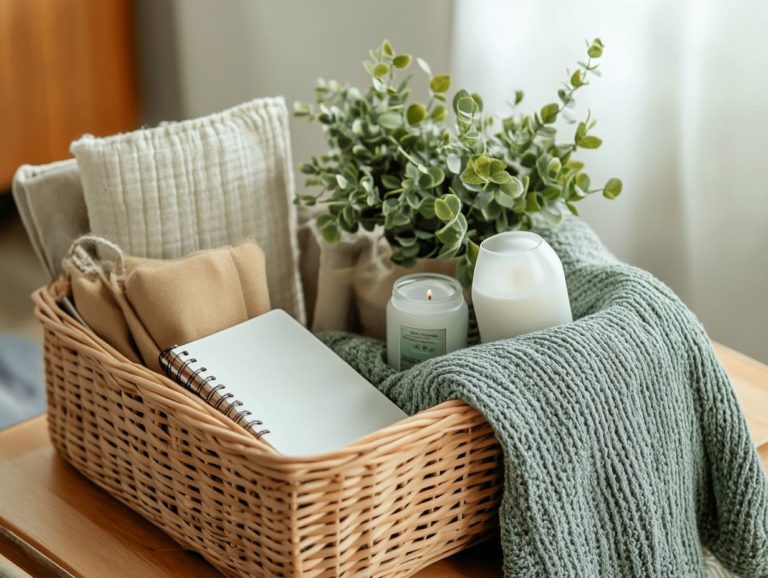7 Simple Self-Care Routines for Parents
Contents
- Self-Care Routines for Parents
- Key Takeaways:
- 1. Take a Break from Parenting Duties
- 2. Practice Mindful Breathing
- 3. Find a Hobby You Love
- 4. Prioritize Sleep
- 5. Build Connections with Other Parents
- 6. Prioritize Your Own Health and Wellness
- 7. Ask for Help When Needed
- What Is Self-Care and Why Is It Important for Parents?
- How Can Parents Find Time for Self-Care?
- What Are Some Common Barriers to Self-Care for Parents?
- How Can Self-Care Benefit Both Parents and Children?
- What Are Some Other Simple Self-Care Practices for Parents?
- How Can Parents Incorporate Self-Care into Their Daily Routine?
- Frequently Asked Questions
- What are 7 simple self-care routines for parents?
- How is self-care important for parents?
- What are some signs that parents may need to prioritize self-care?
- How can parents find time for self-care?
- Can practicing self-care benefit children as well?
- Are there any resources or support for parents looking to incorporate self-care into their routines?
Self-Care Routines for Parents
Parenting is a rewarding journey, yet it can also feel like an uphill battle at times. Amid the whirlwind of daily responsibilities, it s all too easy for you to overlook your own health and well-being.
This article delves into seven straightforward self-care routines designed to help you restore balance and rejuvenate your spirit. From carving out time for breaks to forging connections with fellow parents, these practices not only enhance your health and well-being but also create a positive ripple effect on your children.
Explore how prioritizing self-care can transform not only your life but also the dynamics within your family. Proper time management can significantly aid in balancing your responsibilities and self-care practices.
Key Takeaways:

- Take regular breaks from parenting duties to recharge and avoid burnout.
- Practice mindful breathing to reduce stress and stay present in the moment.
- Engage in a hobby or activity you enjoy to promote relaxation and self-expression. Start a gratitude journal today to reflect on your positive experiences.
1. Take a Break from Parenting Duties
Taking a break from parenting duties is essential for your emotional health and well-being. It helps you recharge and combat feelings of emotional exhaustion.
This necessary pause not only helps prevent burnout but also helps your family get along better. When you prioritize self-care and creative rest, you can engage more positively with your children.
By carving out time for personal restoration, you ll find that you can truly savor quality family moments while practicing stress relief techniques, benefiting both yourself and your kids.
Exploring self-care practices can take many forms, and embracing them is vital for any parent looking to cultivate a nurturing environment for their family. For instance, consider incorporating mindfulness exercises into your routine; just a few minutes of deep breathing or meditation can help clear the mental clutter and provide mental rest.
This allows you to approach your responsibilities with renewed clarity. Short bursts of physical activity, affectionately dubbed “exercise snacks,” can invigorate both body and mind.
Even a quick walk or a few jumping jacks can make a difference, as emphasized by experts like Adam Borland, Ph.D. from the Cleveland Clinic, who advocates for the importance of physical engagement even in small doses.
Joining community groups or connecting with fellow parents can also provide a sense of support and shared experience. Erin Leyba, author of “Joy Fixes for Weary Parents,” points out how these connections can alleviate feelings of isolation and enrich your individual parenting journey.
Such practices not only enhance your personal well-being but also model healthy habits for your children, ultimately strengthening the bonds within your family.
2. Practice Mindful Breathing
Mindful breathing is an essential self-care technique that can significantly enhance your emotional health and provide immediate stress relief. It allows you to regain mental clarity and focus amidst the busyness of your life as a parent.
By dedicating just a few minutes each day to engage in deep, intentional breaths, you can create a safe haven within yourself to combat feelings of emotional exhaustion.
This practice subtly shifts your body s response to stress, promoting relaxation and improving your overall mental well-being.
You can use resources like gratitude apps as gentle reminders to appreciate the small moments, fostering positivity in your daily routine.
Additionally, guided exercises from books like “Joy Fixes for Weary Parents” by Erin Leyba from New World Library offer structured methods to seamlessly incorporate mindful breathing into your life.
Consistently practicing these techniques not only alleviates immediate tension but also cultivates a lasting sense of calm, making it much easier for you to navigate the challenges of parenting.
3. Find a Hobby You Love
Engaging in hobbies or enjoyable activities can be an important self-care activity for you as a parent. It allows you to celebrate personal achievements while nurturing your interests beyond the realm of parenting.
Whether it’s hiking, painting, or joining a local sports team, these pursuits can also help in burnout prevention. By exploring various pursuits, you can significantly enhance both your physical health and mental well-being.
These activities also promote personal fulfillment and create valuable opportunities for social connections and community involvement, which are essential for achieving a balanced life.
Community support is vital! It helps you connect with others who understand your journey. Surrounding yourself with like-minded individuals fosters an encouraging environment.
You re encouraged to involve your children in these shared activities. This not only strengthens family bonds but also teaches them the value of maintaining a balanced lifestyle together.
Such connections cultivate a profound sense of belonging, ultimately contributing to a happier and healthier family dynamic.
4. Prioritize Sleep
Establishing good sleep habits is essential for you to recharge your energy levels and combat emotional exhaustion. This significantly impacts your overall health and well-being.
Quality sleep not only revitalizes your physical state but also plays a crucial role in building the ability to cope with stress. The American Institute of Stress points out that insufficient rest can escalate stress levels, creating a vicious cycle of anxiety and fatigue.
To create a restful environment, remove screens and noise. Use calming scents like lavender to help you relax.
Creating a consistent bedtime routine by setting a regular sleep schedule and engaging in wind-down activities such as reading or meditation can facilitate deeper sleep and aid in mental recovery. Ultimately, this paves the way for a happier, healthier mindset.
5. Build Connections with Other Parents

Connecting with other parents fosters vital social connections that provide essential relationship support. This creates a sense of community, which is crucial for your emotional well-being during those challenging parenting moments.
Engaging with fellow parents through local meet-up groups, online platforms like Facebook or Meetup, and community centers offers you invaluable opportunities to share experiences and advice.
These interactions can lead to the development of supportive relationships that not only alleviate feelings of isolation but also encourage collaboration on family activities, such as potlucks or playdates. This sense of relationship support is fundamental for emotional well-being.
As you come together, you can cultivate creative respite through joint ventures. This allows you to recharge while building lasting memories with your children.
Ultimately, this sense of belonging and shared experience strengthens both your journey through parenthood and your personal growth. Try to connect with other parents today!
6. Prioritize Your Own Health and Wellness
Prioritizing your own health and wellness is not just a luxury; it s a fundamental aspect of self-care that gives you the power to effectively manage stress, maintain emotional well-being, and stave off burnout.
By incorporating short bursts of activity what you might call “exercise snacks” into your daily routine, you can enhance your physical fitness without the need for extensive time commitments. These quick, manageable sessions of movement can seamlessly fit into your day, whether it’s during a lunch break or while engaging in play with your children. This approach can be supported by using fitness apps like Zombies Run! to make exercise more enjoyable.
This incremental approach to exercise does more than just boost your physical health; it significantly uplifts your mood and emotional resilience. When you pair these exercise snacks with other wellness strategies, such as mindfulness practices and balanced nutrition, you create a holistic approach to your health.
Utilizing resources like fitness apps or seeking guidance from wellness experts health coaches or professionals who guide you in your health journey can offer invaluable support in establishing these habits, ensuring that you feel fully equipped on your journey toward well-being. Websites like freerice.com can also provide engaging ways to combine physical activity with social good.
7. Ask for Help When Needed
Asking for help when you need it is a vital aspect of self-care for parents. It fosters a sense of community support and alleviates the emotional exhaustion that often accompanies parenting responsibilities.
By reaching out to family or friends, you can tap into a wealth of experience and advice while receiving the emotional backing necessary for your journey. Engaging with local parenting groups or online communities opens doors to shared resources, ensuring you never feel isolated in your struggles.
This collaborative approach not only helps lighten your load but also strengthens relationships, cultivates understanding, and nurtures a sense of belonging among parents. Embracing this support doesn t signify weakness; rather, it showcases the strength found in community, enriching your parenting experience with compassion and connection.
Community support plays a crucial role in navigating the challenges of parenting.
What Is Self-Care and Why Is It Important for Parents?
Self-care entails deliberate actions aimed at prioritizing your emotional and physical health, which is particularly crucial for parents who often place their own needs on the back burner while tending to their children. This practice encompasses various ways of taking care of yourself, including mental health and burnout prevention, enabling you to maintain a balanced lifestyle and nurture your family more effectively. It’s especially important during high-stress times like the holiday season, including Thanksgiving, to ensure you can provide the best care for your loved ones.
By weaving self-care into your daily routine, you can experience enhanced emotional health, improved relationships, and an elevated overall quality of life. This practice revitalizes your energy, ensuring you re always at your best for your family.
Self-care is far from mere indulgence; it represents a proactive strategy for managing the demands of parenting. Research from the American Institute of Stress and insights from Erin Leyba in Joy Fixes for Weary Parents underscore that parents frequently confront elevated stress levels due to their responsibilities, which can lead to emotional exhaustion.
Experts recommend setting aside time for activities like exercise, meditation, or engaging in hobbies, as these can drastically reduce anxiety and foster resilience. Engaging in an exercise routine like Zombies, Run! can add an element of fun to your self-care. By prioritizing self-care, you not only reconnect with yourself but also create a more harmonious and nurturing environment for your children, benefiting everyone involved.
Start today take a moment for yourself and feel the difference!
How Can Parents Find Time for Self-Care?
Finding time for self-care amidst the demands of parenting can feel overwhelming, but it s crucial to carve out precious moments for yourself without compromising quality family time. With some effective time management techniques, you can achieve this balance!
Set clear priorities and establish a daily schedule to identify valuable pockets of time for rejuvenating activities that align with your lifestyle. For instance, engage in a 10-minute morning meditation before the household stirs to provide a refreshing start to your day. Consider a family walk after dinner, which not only promotes physical activity but also nurtures a shared bonding experience.
Seize brief intervals during lunch breaks or while waiting for your child s extracurricular activities to wrap up. Use that time to indulge in a favorite book or listen to some soothing music. These simple steps can make a big difference in enhancing your well-being while ensuring you remain present for your loved ones.
What Are Some Common Barriers to Self-Care for Parents?

Common barriers to taking time for yourself in parenting often stem from feeling overwhelmed, societal expectations, and a lack of community involvement. These challenges can hinder you from prioritizing your well-being. Postpartum depression can also be a significant barrier that new parents need to address.
The constant juggling of responsibilities and the pressure to create a perfect home can leave you feeling utterly drained. This makes it challenging to find even a moment for yourself. As a caregiver, it s all too easy to place your children s needs above your own, often at the expense of your mental and physical health. This pattern can breed feelings of guilt and stress, leading you to believe that carving out time for self-care is a luxury rather than a necessity.
Parenting experts like Jessica Schrader and Adam Borland, Ph.D. from the Cleveland Clinic emphasize the importance of overcoming these barriers. To break free from these challenges, nurture strong relationships with friends and family to gain emotional support. Explore local community resources, such as parenting groups or wellness workshops like those offered by the New World Library to foster collective care and promote a healthier lifestyle for both you and your family.
How Can Self-Care Benefit Both Parents and Children?
Taking time for yourself offers remarkable benefits not just for you as a parent, but also for your children. When you prioritize your health and well-being, you create a nurturing and emotionally available environment that enriches their lives.
Taking the time to recharge and engage in activities that promote your physical and mental health helps you cultivate a sense of balance and stability, profoundly influencing your children s development. For instance, practicing mindfulness or incorporating regular exercise into your routine can help you demonstrate greater patience and emotional resilience qualities that your children will naturally look to emulate.
This dynamic fosters a safe atmosphere where your children feel comfortable expressing their emotions, enhancing their social skills and emotional intelligence. By modeling these healthy habits, you not only improve your life, but also empower your children with invaluable life skills. In doing so, you set up a lasting legacy of well-being that your children will cherish!
What Are Some Other Simple Self-Care Practices for Parents?
Simple self-care practices think mindfulness techniques, short bursts of exercise, and healthy sleep habits can truly elevate your emotional health and overall well-being as a parent.
Incorporating these practices into your daily routine may be easier than you think. For instance, you could carve out just five minutes each morning for deep breathing or meditation, perhaps while your kids enjoy breakfast. Exercise doesn t always have to mean hitting the gym; it can be as delightful as dancing with your little ones or taking a brisk walk during their nap time.
Establishing a consistent bedtime routine, complete with screen-free zones and relaxation techniques, can help everyone unwind together. This fosters harmony and better sleep for the whole family.
Practicing mindfulness techniques can enhance your sleep quality and boost your emotional health.
By weaving these small but powerful changes into your life, you not only care for your own well-being but also set a positive example for your children.
How Can Parents Incorporate Self-Care into Their Daily Routine?
Incorporating self-care into your daily routine requires planning your time wisely and a commitment to prioritizing your personal well-being alongside your parenting responsibilities. Taking cues from self-care experts like Erin Leyba and Jessica Schrader can make this process more manageable.
To achieve this, consider carving out specific time slots dedicated solely to self-care activities. Whether it s savoring a quiet cup of coffee in the morning, enjoying a brief moment during Thanksgiving celebrations, or indulging in a short yoga session after the kids have gone to bed, these moments are essential.
Get your kids involved in self-care now! It creates a supportive atmosphere and turns self-care into a fun family activity. Weekend hikes or gardening sessions can become enjoyable bonding activities that also promote individual well-being.
Consistency is crucial. By regularly engaging in self-care, you enhance your own happiness and foster a more harmonious family dynamic. This encourages your children to value their own self-care as they grow, setting a lifelong precedent for their well-being. Including family-friendly activities, like programming fun apps such as JavaScript games, can make self-care enjoyable for everyone.
Frequently Asked Questions
What are 7 simple self-care routines for parents?

- Making time for regular exercise, even if it’s just a short walk or yoga session.
- Prioritizing healthy eating habits, such as meal planning and cooking nutritious meals.
- Setting aside time for relaxation and self-reflection, whether it’s through journaling or meditation.
- Engaging in a hobby or activity that brings joy and allows for a mental break from parenting responsibilities.
- Getting enough sleep and avoiding burnout by practicing good sleep hygiene.
- Setting boundaries and saying no to activities or commitments that may add unnecessary stress.
- Connecting with friends and loved ones, whether in person or virtually, to maintain a support network.
How is self-care important for parents?
Self-care is essential for parents because it allows them to recharge and refuel, both physically and mentally. By taking care of themselves, parents can better handle the demands and challenges of raising children, leading to a more fulfilling and balanced life.
What are some signs that parents may need to prioritize self-care?
Some signs that parents may need to prioritize self-care include feeling constantly exhausted, overwhelmed, and irritable. Other signs are experiencing a lack of motivation or interest in activities and neglecting their own physical and emotional needs.
How can parents find time for self-care?
Finding time for self-care is essential. Parents can try waking up earlier, delegating tasks to other family members, or even scheduling self-care time on their calendars. It’s also important to remember that self-care doesn’t have to be time-consuming and can be incorporated into everyday activities.
Can practicing self-care benefit children as well?
Yes, practicing self-care can benefit children as well. When parents take care of themselves, they become better role models. They can teach their children the importance of self-care.
Taking care of one’s physical and mental health improves parenting, leading to a more positive and calmer household.
Are there any resources or support for parents looking to incorporate self-care into their routines?
Yes, there are many resources for parents looking to prioritize self-care. Discovering online communities and support groups can empower parents.
Explore books, apps, and podcasts that inspire you to make self-care a priority every day!






